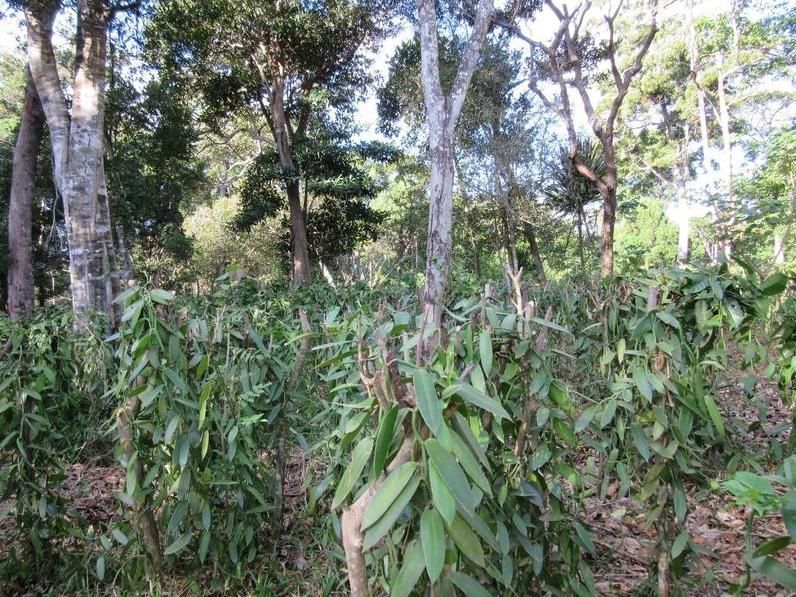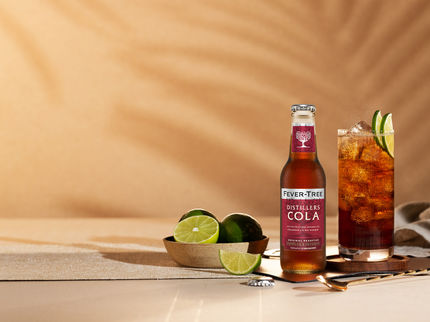Vanilla cultivation: potential for sustainable land use in Madagascar
Advertisement
Madagascar is the most important producing country for vanilla - the fragrant flavoring agent of desserts and pastries. The vanilla orchid is cultivated in the tropical northeast of the island. A research team from the University of Göttingen and the University of Antananarivo has been studying vanilla cultivation and its impact on people and nature for the past five years.

The vanilla orchid is suspended on other plants (foreground) and growing under the tree canopy (background) of this former forest area.
D. Martin
It showed that vanilla cultivation in agroforestry systems, where the vanilla grows under shade trees, has benefits for both humans and nature compared to other forms of land use. However, this is only the case when vanilla is planted on already deforested fallow land. The findings appeared in the journal Proceedings of the National Academy of Sciences.
Madagascar is the most important producing country for vanilla - the fragrant flavoring in desserts and pastries. The vanilla orchid is cultivated in the tropical northeast of the island. A research team from the University of Göttingen and the University of Antananarivo has been studying vanilla cultivation and its impact on people and nature for the past five years. It showed that vanilla cultivation in agroforestry systems, where the vanilla grows under shade trees, has benefits for both humans and nature compared to other forms of land use. However, this is only the case when vanilla is planted on already deforested fallow land. The findings appeared in the journal Proceedings of the National Academy of Sciences.
The research team collected data on biodiversity and ecosystem services such as carbon storage, as well as how the harvest turns out under different land uses and how profitable they are. The scientists focused on vanilla agroforestry systems. These are often established directly in the forest: Farmers remove shrubs and individual trees, and plant the vanilla orchid directly under the remaining trees. Alternatively, however, vanilla agroforestry systems can be established on fallow land, which is regularly prepared for rice cultivation by slash-and-burn clearing, and is therefore more open.
The team incorporated land use history - previous land use - into the analysis. Data on species richness of seven species groups, five ecosystem services, and harvest and profitability were each compared to the previous land use. This interdisciplinary approach allowed us to explore the positive and negative impacts of land use change from a holistic perspective.
Vanilla agroforestry, which is established on open fallow land, brings clear benefits to people and nature. In contrast, the conversion of forests to vanilla agroforestry systems causes disadvantages for animals and plants, as important functions of forests are lost. Converting more forests to vanilla agroforests can thus only be justified as an alternative to slash-and-burn agriculture, where both biodiversity and ecosystem services suffer even more significantly.
Dr. Fanilo Andrianisaina, a researcher at the University of Antananarivo, Madagascar, highlights the benefits of vanilla cultivation for farmers: "At the prices we were able to document during the study period, vanilla is basically profitable. Of course, a lot of money also stays with the middlemen and exporters, but many vanilla farmers have been able to afford new houses, solar panels or motorcycles; this was unthinkable before." However, the team also observed that vanilla prices have collapsed over the past two years, putting profits at risk.
Thus, there is also the question of how far the research findings can be applied to the future and to other landscapes. "It seems to me that a fair and stable vanilla price is extremely important in the long term," says Dr. Dominic Martin of the University of Göttingen, the study's lead author. "The constant ups and downs in prices make it impossible for producers to focus on potentially sustainable vanilla cultivation - the risk of depending economically only on vanilla is simply too high," he adds. Prof. Dr. Holger Kreft of the University of Göttingen, who coordinated the study, says: "Prior land use is crucial in assessing land use change in other regions of the world as well. Our model is thus universally applicable, and this also highlights the global relevance of our results."
Note: This article has been translated using a computer system without human intervention. LUMITOS offers these automatic translations to present a wider range of current news. Since this article has been translated with automatic translation, it is possible that it contains errors in vocabulary, syntax or grammar. The original article in German can be found here.


























































